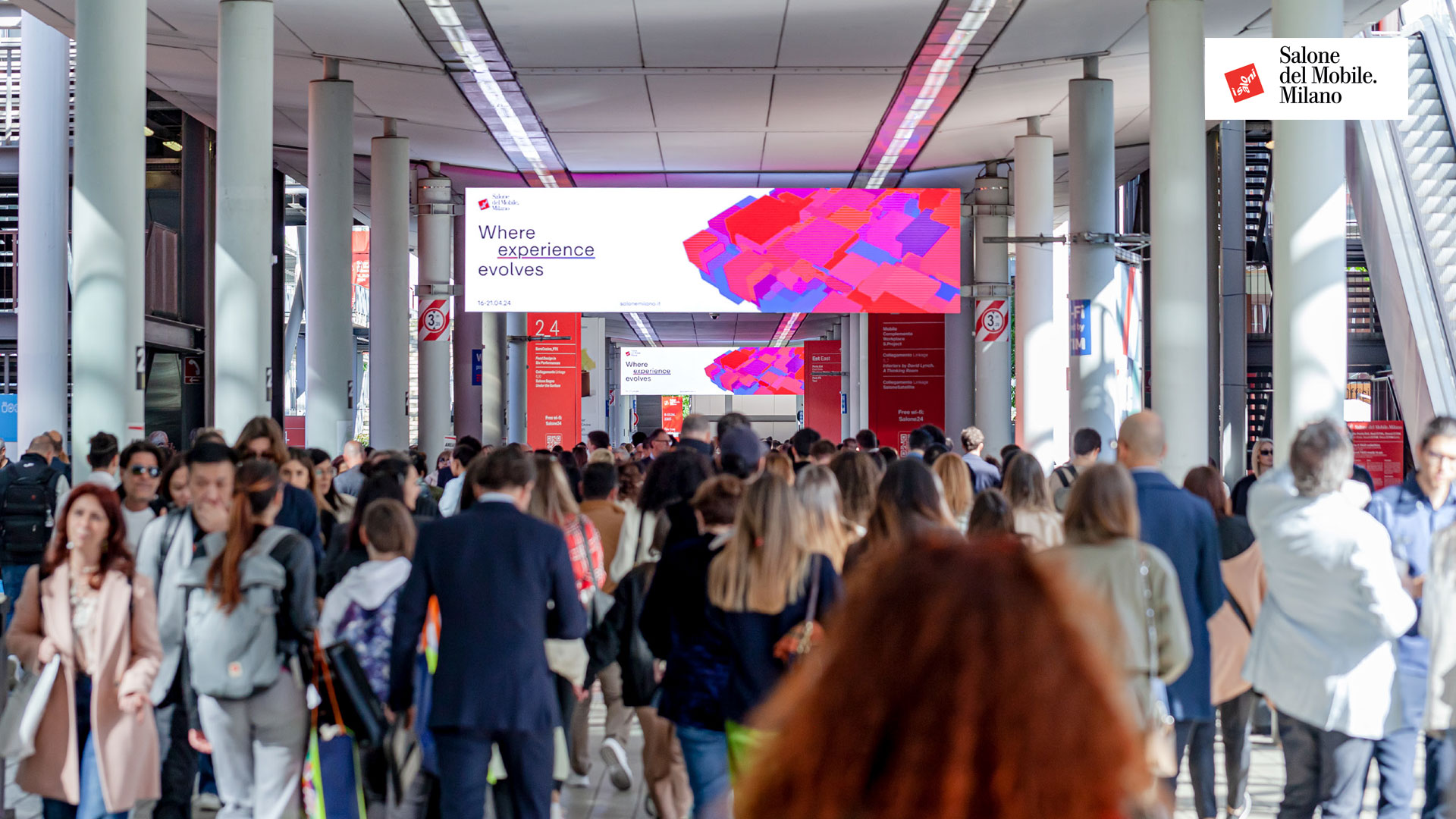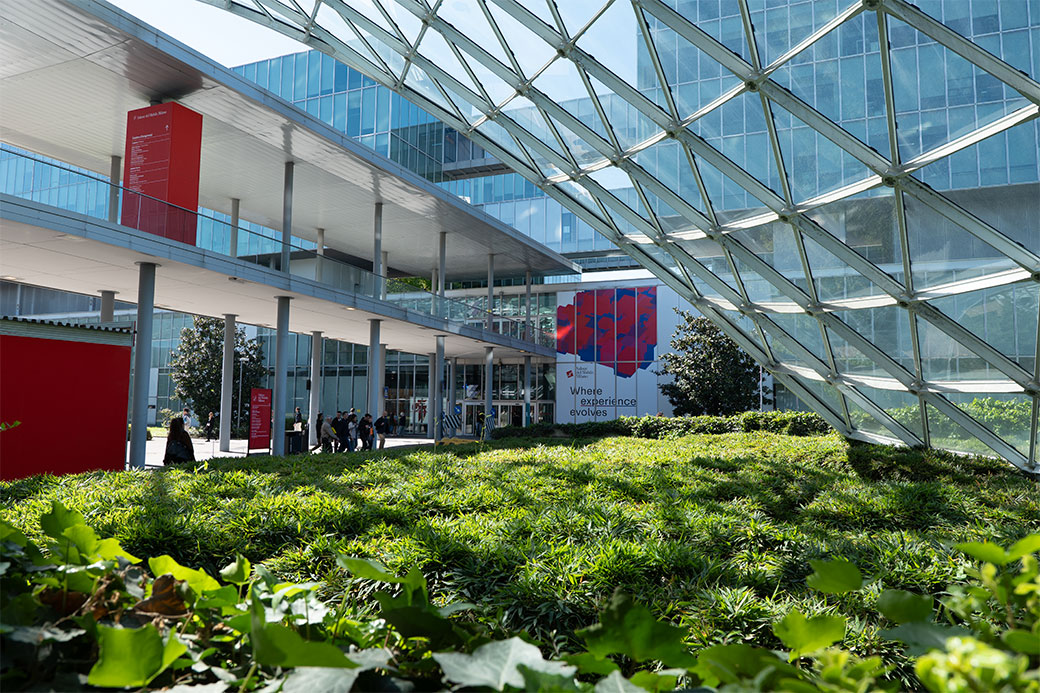

In recent years, we have witnessed a clear trend: the most important B2B trade shows worldwide have been designed with an absolute priority on visitor experience rather than merely showcasing products. This entails creating an engaging and meaningful environment beyond the display of exhibited products. This approach requires designing exhibition paths based on a human-centred philosophy, organising cultural events, conversations, and sensory experiences related to the fair's theme, and adopting innovative technologies to enhance guest interaction with exhibition stands.
The goal is to transform the trade show into a place for storytelling and industry promotion, moving beyond the simple commercial transaction of order collection. It involves creating an experience that engages stakeholders and even consumers of industry brands, thereby elevating and making the entire sector more interesting.
This approach fosters a deeper connection with the meaning and vision of participating companies and makes the overall trade show experience more memorable and rewarding for all participants.
To confirm that, here's a critical example: It's just these days that even IFA Berlin has decided on a bold change, breaking away from the past to keep up with new demands.
In a recent development, the renowned IFA Berlin has unveiled a contemporary identity, bidding adieu to the outdated 'Funk Otto' logo and the archaic 'Internationale Funkausstellung' name (which translates to "International Radio Exhibition" in English).
The acronym remains, of course, but IFA now stands now for 'Innovation Für All /Innovation for All,' shifting its focus from products to experiences.
Enjoy here the official press release about this piece of news. This exciting rebranding initiative has been entrusted to the fashion-forward agency Highsnobiety.
This update breathes new life into the venerable institution, signalling a fresh direction and a commitment to inclusivity and modernity.
In this context the 2024 Milano' Salone del Mobile', the world's most significant design event, stands out as a trendsetter in this new era of trade shows. Its 62nd edition, held from [April 6th to 21st], showcased a human-centred and customer-centric approach.
The event featured immersive installations, cultural events, conversations, and design experiences, attracting visitors from around the globe.
The fair seems to have embraced the Simon Sinek 'Golden Circle' concept, a strategic approach that starts with the 'why' rather than the 'what' or the 'how '. This shift in perspective has allowed the fair to focus on the meaning and purpose behind the products and services showcased, creating a more engaging and meaningful environment for visitors. It has also provided an opportunity for visitors to connect with the vision and purpose of the exhibiting companies.
Salone del Mobile di Milano has significantly invested in enhancing the visitor experience, striving to optimise pathways and providing more space for narrating the why behind things rather than the what. This approach has enabled companies to communicate their purpose more effectively and engage the audience.

It’s that time of the year again when Milano hosts its internationally acclaimed stage for the “beautiful” and “well-crafted”. Salone del Mobile, held every April, has been a cornerstone in the furniture and design industry at global level since 1961. It alternates biennial events Euroluce, EuroCucina, and the Salone Internazionale del Bagno. The former in odd years, the latter two in even years, as is the case with the 2024 edition. The 62nd edition is taking place at Fiera Milano Rho from April 16th to 21st and is marked by a new and challenging approach, continuing its evolutionary process and transformation in order to consolidate its international leadership in the furniture and design sectors.
At operational level this translates, among other novelties, into a radical rethink of
layouts and itineraries within EuroCucina,
with a communication campaign created through artificial intelligence. This year the
FTK - Technology For the Kitchen - pavilion is integrated into the main venue, and the Salone Internazionale del Bagno was conceived with the contribution of neuroscience and under the banner of a human-at-the-center philosophy.
Moreover, attendees can indulge in an awe-inspiring array of cultural delights throughout the event. Let's not overlook the jubilant festivities commemorating the 25th anniversary of SaloneSatellite—a springboard for budding designers and a hotspot for companies scouting fresh talents. This edition proudly features approximately 600 designers from 37 countries and representatives from 22 Design Schools and International Universities spanning 13 nations.
And of course, we can't forget the pulsating energy that will electrify the city center, courtesy of the Milano Design Week's unparalleled recipe and the myriad events of the FuoriSalone.
To gain even greater clarity on how this important fair is evolving and how it aims to become even more appealing, Homa Design magazine had the big chance to talk to Salone del Mobile’s President Maria Porro.
Find, here below, the full interview.
--------------------------------
Homa Design Magazine discussed all of this, and more, with President Maria Porro:
In the 2024 edition of the Salone del Mobile, FTK-Technology For the Kitchen is effectively integrated into the new spaces of EuroCucina. Is this confirmation that the world of appliances is playing an increasingly central role within the kitchen environment, also in terms of design?
It is absolutely so, the integration of appliances into kitchen design is a fact.
Just think of fully integrated induction hobs in kitchens, or the invisible ones hidden under the surface of the countertop. The integration of FTK within EuroCucina is the result of the evolution of the furniture industry, which today, when called upon to design a new kitchen, starts from the technological innovations developed in the world of appliances. This integration also brings a greater design freedom and the use of new materials that allow for the creation of a seamless connection between the furniture and the appliances.
The new layouts of the Biennials also mean a new positioning in pavilions 2 and 4. What’s the reason behind this move?
In fact there are two: on one hand, to consolidate the physical location of the Biennials, which in the future will tend to stay there, and on the other hand, to create a whole district dedicated to the world of furniture, with all the major manufacturers who always participate in the event, and the various pavilions being closer to each other and more accessible.
Also in this edition, many events will be related to food design...
Food design stands at the forefront of research in the culinary field.
We chose to link many events to this theme, through the participation of independent culinary magazines, artists, and food designers, in order for food research to take center stage. This is also a way to evolve the “furniture” product, which aim is indeed to prepare and cook food. This “reverse” approach to the product represents, in my opinion, the most unrestricted and interesting form of research, both for visitors and for the companies participating in the Salone del Mobile.
In the past months the Salone has been engaged in a world tour. For what purpose? Our priority is to enhance the quality of visitors who come to the Salone, which is why we have chosen to promote it with a world tour, touching Europe, the United States, Canada, China, India, Japan, Korea, and South Africa. We were able to meet with high-quality stakeholders whom we want to come and visit the Salone and discover our companies and brands.
Shanghai’s Red Night last November proved the strategic importance of the Chinese market for Italian design. What opportunities does China offer today, and in the near future, for the world of Italian designer furniture?
The Salone has a crucial role in facilitating encounters among top players, which may translate into solid and enduring relationships over time. On one hand, it supports companies in strengthening existing connections, while on the other hand, it assists companies that have not yet entered foreign markets in discovering their optimal positioning. Moreover, when expanding abroad, the Salone handpicks the brands it introduces, thereby guaranteeing the quality expressed by these companies participating in the international editions. This role for the Salone del Mobile Shanghai is significant as it helps Chinese final consumers and buyers understand which players are the most important, innovative, and reliable. China is a vast territory, and currently, the distribution of brands is mostly limited to first-tier cities and only occasionally to second-tier ones. Therefore, it is a market that offers numerous opportunities, and the quality of designers is constantly improving. Consequently, establishing relationships with interior designers and architects would make for very interesting synergies for the world of Italian furniture. The COVID-19 pandemic put this opportunity on hold for a long time, but today, all conditions are there for it to happen.
What contribution can the Salone del Mobile, and more broadly, Italian-made, offer to the Chinese/Asian markets in terms of environmental sustainability?
When I think of European Union’s regulations
on environmental sustainability, the European Green Deal, or the United Nations Global Compact (advocated in 1999 to promote a sustainable global economy), there’s a very clear indication that the entire Italian furniture system and
the Salone, both as the organizer of the event and in the content it offers, have moved along the sustainability path with great seriousness. This clearly shows in the ISO 20121 certification, obtained in 2023, for the sustainable management of the entire event and in particular of the areas dedicated to this subject, as well
as for a series of initiatives and actions aimed
at implementing principles of circularity and regeneration. These issues are central to our actions and to our thinking.
In your opinion, what are the main challenges that designers and architects will have to face in designing the future of our homes and living spaces?
Certainly, the durability of products and their ability to be replaceable, repairable, and renewable will be increasingly appreciated.
In practice, it’s about the intrinsic value of a product and its longevity. The test, therefore, lies not in the product itself but in the service offered to meet these requirements. This is a challenge of the greatest significance since it represents our most sustainable response at this time.
Get ready, shortly the full report of the Salone del Mobile 2024 / Milan Design Week prepared by our team, which naturally attended in Milan, will be available.
- Issued by Federico Rebaudo, General Manager at Homa Europe, April 2024
- The Interview with Maria Porro is from Homa Design Magazine – N°4
Homa Design Magazine is a Homa editorial project to promote design culture.
Editor in Chief: Federico Rebaudo
Project Coordination: Federico Gallina
Art Direction: Sara Marabini
Editorial Coordination: Studio Volpi srl
For further Information and Press Contacts: info@homaeurope.eu
